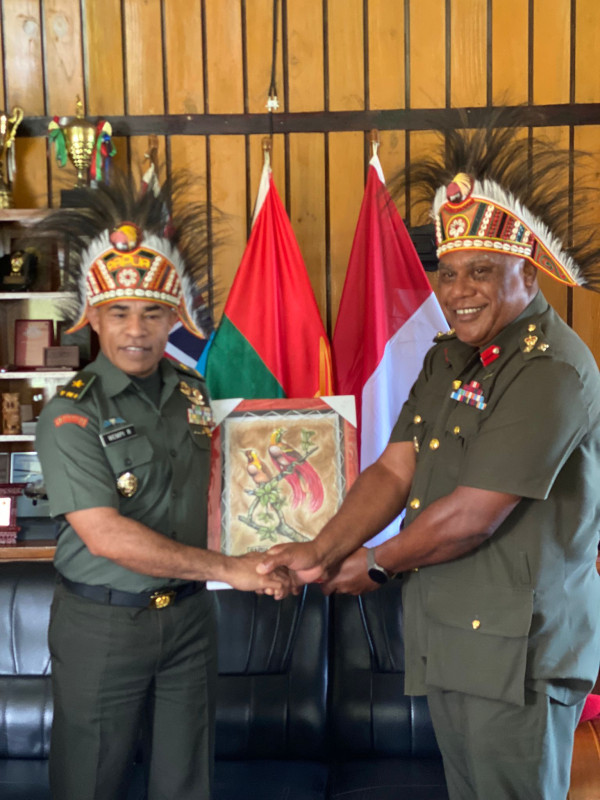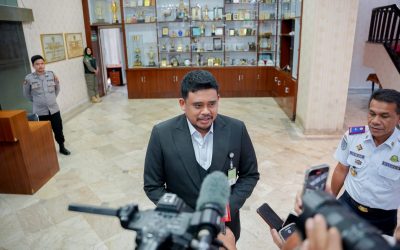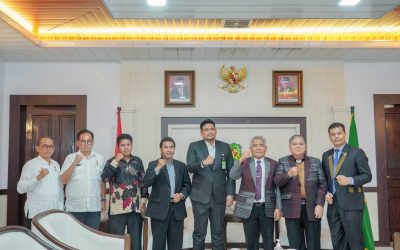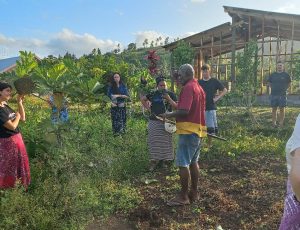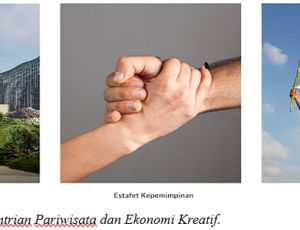Indonesia’s strategic diplomacy positions is about to improve regional security, peace, and advance education and training in a variety of sectors, including military education. These goals are the foundation of its diplomatic ties with the Pacific region. In addition to being a neighbor geographically, Indonesia, a country in Southeast Asia with vast marine borders, sees the Pacific area as a region of great political and economic importance. In an effort to improve ties and tackle shared regional concerns like climate change, economic growth, security, and education, Indonesia has been quite active in the Pacific throughout the years.

Source: Photo Of Brigadier General Wempi Ramandei with Brigadier General Onisivoro Covunisaqa the Land Forces Commander Of The Republic Of Fiji Military Forces In Suva, Fiji
Although both countries commemorate 50 years of diplomatic relations, the relationship between Indonesia and Fiji is significantly from this perspective. Fiji, a significant Pacific Island nation, is strategically located and has a number of purposes in common with Indonesia, such as human resource development, marine security, humanitarian assistance and disaster relief (HADR), and sustainable education. Additionally, both nations understand the need of using soft power to promote peace and stability in the area, particularly through the promotion of culture.
On October 29 and 30, 2024, the Indonesian National Army (TNI AD) and the Defense Attaché of Indonesia for Fiji, Colonel Dedy Rahmanto, conducted an important and historic diplomatic engagement with the Land Forces Command of the Republic of Fiji Military Forces (RFMF) in Suva and with the Joint Task Force Command, Blackrock Camp in Nadi.
The meeting was attended by six delegates from the Indonesian National Army (TNI AD), which is part of efforts to strengthen diplomatic relations and military cooperation between Indonesia and countries in Pacific region, particularly Fiji. The TNI AD delegation included Brigadier General Wempi Ramandei and several officers: Colonel Samuel Jefferson Aling, Lieutenant Colonel Amaraldo Cornelius, Major Alsafano David Menasse Ramandey, Captain Angga Trisna Nugraha, and Captain Abraham Antoni Ferdinand Fimbay.
During this meeting, Brigadier General Wempi Ramandei emphasized that the Indonesian National Army (TNI AD) remains committed to building strategic cooperation with the RFMF. The TNI AD delegation was present to establish strategic communication, exchange information, and strengthen cooperation across various fields, including training and military education.
The Indonesian National Army (TNI AD) and the Republic of Fiji Military Forces (RFMF) on October 29-30, 2024, in Fiji, demonstrated that Indonesia’s strategic diplomacy in the Pacific region is increasingly reinforced through comprehensive defense cooperation. Through interactions between the delegations, TNI AD and RFMF sought to understand security dynamics and the spirit of mutual benefit.

Source: Photo Of Brigadier General Wempi Ramandei with Brigadier General Onisivoro Covunisaqa the Land Forces Commander Of The Republic Of Fiji Military Forces In Suva, Fiji
After the meeting, Brigadier General Onisivoro Covunisaqa received a traditional gift from Brigadier General Wempi Ramandei: a palo-palo, or bird of paradise crown. The gesture demonstrated the close relationship between Indonesia and Fiji, and their dedication to respecting and working together. In addition to celebrating cultural legacy, the exchange of such presents helps to build relations between nations and emphasizes the value of cooperation in engaging regional issues.
The purpose is to increase tolerance, reduce stereotypes, and advance diplomatic relations through a better understanding of cultural identity. Both Indonesia and Fiji have committed to incorporating the long-term advantages of this military cooperation in order to encourage broader cultural understanding through mutual support, soft power, and integrating cooperation.
Integrating cooperation into multinational military training can help create stronger bonds among soldiers from various countries. Training programs that incorporate can strengthen invaluable complex situations.

Source: Photo Of Tni Ad Delegations Engaged The Joint Task Force Command Officers, Blackrock Camp In Nadi.
In future, the application of military cooperation can become an increasingly important means of diplomacy, aiding in the enhancement of collaboration and mutual understanding within the context of global security and peace. The global security and defense context allows diplomacy to be conducted without confrontational approaches.
Therefore, soldiers’ competencies and skills are greatly improved when military cooperation is incorporated into training and military education. This integration builds relationship amongst personnel and emphasizes the value of a strategic partnership in military training. Additionally, it encourages cooperation in regional research, which raises understanding of military personnel’ roles and responsibilities. Military organizations can better prepare their people for the specifics current operating conditions by placing a strong emphasis on cooperative training.
Author: Pernandus Simanullang, S.S., M.Sn, FM


